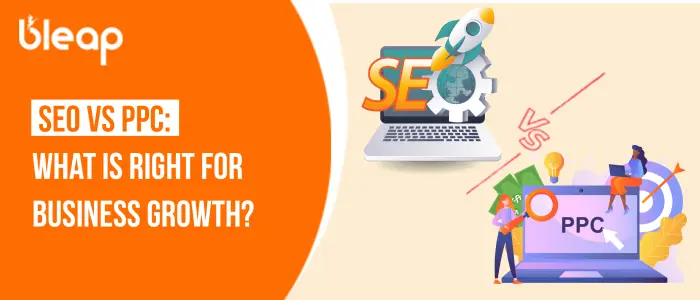Are you venturing out your own business? And looking for the perfect marketing strategy to boost it? If you have already researched digital marketing agencies in Bangalore, well, SEO and PPC are some common marketing strategy names that must have popped up on your screen. You must have also overturned thousands of websites to get to know them properly. But after all these endeavors, did you get to the conclusion of which one you need?
Don’t worry. This blog will clarify your doubts about what is SEO and PPC, the differences between SEO and PPC, and which one is better for your business.
What is SEO?
Search engine optimization, or SEO, is the process to improve a website’s visibility in the search engine results (SERP), like Google, by optimizing some elements like keywords, meta descriptions, backlinks, and so on.

An effective SEO strategy can help your website rank higher in search results, making it visible to a wider range of the public. This automatically drives more organic traffic to your website and boosts your brand’s awareness among customers.
How does SEO work for your business?
SEO is an extensive process conducted in several important steps. First, it begins with competitor analysis and keyword research, where you learn what are the search queries, for your service or product searched by potential customers. A detailed competitor analysis helps to frame a detailed strategy for the next steps in SEO.
Then content creation comes into play, which is about framing these key phrases in some useful, entertaining content such as blogs, page content, or product descriptions.
The third step is on-page optimization, which ensures that every page of the website is search-engine friendly. This involves inserting target keywords into titles, descriptions, headers, meta titles, meta descriptions, etc.
Then, technical SEO is done, which makes the site’s operation speedy, mobile-friendly, and secure. SEO also uses robot.txt to point out which pages need to be crawled by the search engine’s crawler and sitemap.XML to specify which page has to be crawled first.
Lastly, there is link building, which refers to the process of acquiring quality links from other authoritative sites to enhance your site’s authority. When implemented, these steps raise the probability of the site ranking better and gaining more organic traffic and conversions.
Pros and Cons of SEO
|
Pros |
Cons |
| Cost-effective long-term strategy
SEO brings in organic visitors to your sites without any costs related to placing ads, which means you get constant traffic with good management. |
Requires ongoing investment
To keep the rankings stable, constant SEO practices are carried out to avoid the risks arising from algorithm updates and competitors’ actions. |
| Increases brand visibility
Customers will trust and have faith in the brand after high-ranking contents enhance brand recognition. |
Results Take Time
SEO is a long-term strategy that takes three to six months to show results. |
| Drives high-quality traffic
Since users are searching for products or services online, organic search traffic is more likely to convert. |
High Competition for Keywords
Competing for top keywords is challenging and requires significant effort, especially in crowded markets. |
| Improves User Experience
The application of SEO makes a site fast and mobile friendly; it also focuses on enhancing the friendliness of the site, which leads to improved customer interaction. |
Requires Technical Knowledge
In order to implement SEO techniques, it requires in-depth knowledge of all the technical and content strategies or expert assistance. |
| Builds Credibility and Trust
People have more faith in organic search results than in advertising; therefore, being in the first position enhances credibility. |
Algorithm changes impact rankings
The presence of fixed positions may change easily given the continuous evolution of the search engine algorithms. |
What is PPC?
PPC or pay-per-click, as you can guess from the name, is a type of online advertising where businesses pay a fee each time someone clicks on their ad.

PPC ads let you directly buy visits to your site instead of waiting for organic traffic. These ads appear on search engines like Google or social media platforms at the top of search results or user feeds.
How does PPC work for your business?
The first step in the PPC approach for your brand is to carry out keyword research and competitor analysis where appropriate words or phrases or search queries are chosen that your target audience is most likely to use for searching related information.
Then you prepare targeted campaigns with striking ad copies and clear calls-to-action directing readers to certain pages on the site.
After that, you majorly focus on your bidding strategy and budget; here, you state how much you are going to pay per click and the overall budget across all your campaigns or the daily budget.
As soon as your ads are up and running, PPC channels—Google ads or Facebook ads—come with tools that help you aim at targeted groups with certain demographic locations, ages, and interests.
Once the ads are live, you regularly monitor and optimize them by adjusting bids, refining keywords, or testing different ad versions to improve performance and ensure you’re getting the best possible results for your budget.
Pros and Cons of PPC
|
Pros |
Cons |
| Quick results and immediate traffic
It is especially useful for fresh or time-bound offers such as promotional offers since there are immediate results with the traffic getting directed to the site as soon as the campaign is on. |
Can Be Expensive
The expenses involved can be quite high, particularly in very competitive markets, and may not be viable for a sustained period. |
| Targeted Audience Reach
PPC is applied to precise audiences based on geography, preferences, online activity, and social statistics. |
Draws Constant Budget
It is necessary to sustain the investments to maintain visibility; otherwise, the traffic will cease. |
| Easy to Track and Measure
Because PPC networks offer a range of performance measures, it is easy to measure the return on investment and change tactics |
Click Fraud Risk
Inevitably, there are factors such as competition or computerized programs that could result in possible ad clicks and thus cost a budget without generating real users. |
| Increases brand visibility
PPC ads keep your brand top-of-mind for customers by showing up prominently in search results and social media feeds. |
Ad Fatigue
If the users get tired of the same old ads, they will ignore the ads, and the ad’s effect will be reduced over time. |
| Flexible Budget and Bidding Options
You can control overspending as PPC allows you to set daily budgets, bid amounts, and ad scheduling. |
Higher Cost per Click for Competitive Keywords
In competitive markets, high-demand keywords can become costly, potentially limiting ROI. |
Major differences between SEO and PPC
So now that we talked about the pros and cons of SEO and PPC, let’s summarize their differentiating points. This will give you a better grasp of your marketing needs.
|
Aspect |
SEO |
PPC |
| Cost Structure | Free organic traffic; no direct cost per click. | Paid traffic; charges per click, means costs add up with each visit. |
| Speed of Results | Needs time to build rankings, often weeks or months to see significant results. | Immediate results with the launch of ad campaign. |
| Traffic longevity | Continued long-term traffic if SEO is maintained properly. | Short-term traffic; traffic stops once ad budget is depleted |
| Credibility | Organic search results are more trusted by users than ads. | Users overlook “ads,” especially if it is repetitive. |
| Click-Through Rate (CTR) | Generally higher CTR for organic results, especially for informational content. | Can have a high CTR for targeted ads but may suffer from ad fatigue. |
| Targeting Keywords | Targets transactional and commercial keywords. | Targets mainly informational, commercial, transactional, and sometimes navigational keywords. |
| Cost Efficiency | Cost-effective over time; no direct charges for clicks. | Can be costly, especially in competitive industries with high cost-per-click. |
| Control over Placement | Placement relies on search engine algorithms to rank pages. | Full control over ad placement, timing, and audience targeting. |
| Maintenance | Requires ongoing SEO practices to maintain rankings, but less frequent adjustment. | Constant monitoring and budget adjustments are needed to maintain brand visibility. |
| Aimed | Newly launched businesses, Businesses targeting specific geographic areas, businesses in highly competitive industries, businesses with seasonal promotions and limited-time offers, and businesses with a diverse product range. | Established businesses, Businesses with a niche or specialized product offering, Long-term growth and sustainable results, Businesses with limited advertising budgets, |
SEO vs PPC: Which is more beneficial for your business?
The debate “Which one is better—SEO or PPC?” is a never-ending discussion. So we have considered some factors like cost analysis, time to results, sustainability and ROI, scalability, targeting capabilities and reach, credibility and trust to highlight the advantages of both. Let us go through the difference between SEO and PPC concerning these factors.
Cost Analysis
There is a clear difference in structure between SEO and PPC with regard to costs. The focus of SEO is available offline and includes the creation of content, research, keyword optimization, and technical improvements. It does not incur a cost per click, making it ideal in the long run. In other words, when implementation of the SEO strategies is done, organic visits will always be available without paying for every visit.
On the other hand, PPC requires setting up an advertisement budget since advertisers pay for every user that clicks on their ad. This can be expensive, particularly when dealing with competitors who bid for the same high-paying keywords. Although effective use of budget helps in controlling the costs per acquisition in the PPC model, this model cannot be considered viable for business growth due to monthly reoccurring costs when compared to the SEO model.
Time to Results
If a business is looking for rapid results, PPC has a clear advantage. PPC campaigns can be launched quickly, driving immediate traffic and potential sales as soon as the ads go live. This fast turnaround time is valuable for businesses launching new products or running time-sensitive promotions.
According to expert digital marketing agencies, SEO, however, is a long-term strategy that can take from weeks to several months to deliver significant results. Building rankings organically requires consistent content updates, keyword optimization, and link-building, making it more suited to companies that can afford to wait for steady, sustainable growth.
Sustainability and ROI
In the long run, organic traffic generation through SEO efforts is more advantageous than paid traffic via PPC advertising concerning sustainable practices. However, once set in motion, the development of a commitment to SEO draws in more organic traffic without necessitating further payments, which makes it even more effective. That is true for all paid forms of advertisement, sponsored linkage, or any other form of paid traffic—it is not sustainable unless there is a budget that supports all the efforts; the minute the advertising spend halts, the inflow of customers that buy services or goods drops to zero.
Nevertheless, this form of advertising tends to result in a clearer profit picture in a shorter time frame; this is because the enhancement of the company’s profile translates into sales almost immediately. Most advertisers who are concerned about the prolonged returns will appreciate that SEO is more effective and offers durability and ROI than PPC, which is short-term in nature and focused on immediate revenues.
Scalability
Both SEO and PPC offer scalability, but they differ in how this is achieved. SEO scalability involves expanding content, targeting additional keywords, and building more backlinks, all of which improve a site’s authority and visibility gradually. While it takes time, SEO scalability contributes to a long-lasting increase in traffic.
PPC, on the other hand, is highly scalable in real-time; a business can instantly increase reach by raising its ad budget, adjusting bids, or creating new ads. This makes PPC more flexible for rapid scaling, though it also increases costs proportionally. A business that needs to scale quickly often turns to PPC, while those seeking sustainable growth focus on SEO scalability.
Targeting Capabilities and Reach
PPC offers superior targeting options, allowing businesses to pinpoint audiences based on demographics, location, interests, and even recent search behavior. This level of precision enables businesses to tailor ads for audience segments using specific keywords like transactional and commercial, making PPC highly effective for reaching relevant customers.
SEO, while powerful for reaching a broad organic audience, focuses more on general customer needs. SEO relies on keyword optimization to attract users who are actively searching for specific terms, which is valuable but less flexible. PPC’s advanced targeting gives it an advantage for businesses aiming to reach specific customer profiles or test different audiences.
Credibility and Trust
In terms of credibility, SEO holds a distinct advantage, as users tend to trust organic search results over paid ads. Organic listings often appear more authentic, leading to higher trust and credibility with customers. Many users also recognize PPC ads as “sponsored” or “promoted,” which can lead to ad fatigue and a tendency to skip over paid results.
SEO’s organic nature fosters a stronger sense of credibility for brands, which can be particularly beneficial for businesses looking to build a lasting relationship with customers. PPC, while effective for quick visibility, may not contribute as significantly to long-term brand trust.
What if SEO and PPC are combined?
The integration of SEO and PPC greatly benefits a business in myriad ways. First, most search engines can include two or more different facets of the same business; hence, using both paid and organic search results increases the likelihood of the customers seeing and clicking the business’ website.
Second, metrics from pay-per-click campaigns, such as top-performing keywords, can be used to enhance organic search techniques, making it easy and quicker to reach and convert high-traffic sectors of the audience.
Furthermore, while one is waiting for SEO results to come through, PPC can be utilized to bring instant visitors even before organic positions get any rank.
Therefore, together they form an inclusive strategy that increases brand recognition and enhances customer acquisition within a short time frame and also for extended periods.
What is the right solution for your business – SEO or PPC?
From the long discussion about SEO and PPC services, we already know that despite a few cons, both of these digital marketing techniques bring immense benefits to your business. But still, we need to judge which marketing technique is suitable for our business.
For this purpose, we need to access your business from a few points of view, like your budget, business goal, etc. Thinking about these factors will guide you to your answer. Here is a detailed list of the deciding factors.
- Business Goals and Objectives
Ponder about your sales goals; whether you want a long-term, steady market or a quick all-out sale during special launch events. If you have long-term goals, SEO is a better option, but PPC can achieve your sales goals quicker.
- Budget
Calculate your budget for the business. If you are in for a cost-effective marketing strategy, SEO is the answer, while PPC requires a flexible, ongoing budget for immediate results.
- Timeframe for Results
If your main concern is time, PPC delivers instant traffic and sales. But even though SEO may take a long time to show results, it creates a steady and sustainable market for your products.
- Competition Level
Understand your business niche to know your competitors better. PPC offers fast visibility in crowded markets, while SEO service in Bangalore is the best choice in markets where public interest is scarce.
- Target audience demands
Always think first- “Whom should be my customers?” In marketing, what matters is the user’s search intent. In PPC, specific types of keywords like transactional and commercial keywords are targeted, but for SEO, we can use even informational or navigation keywords.
For example, you have a wedding cake business; so if you want to target commercial keywords like “best wedding cakes,” you go for PPC. But if you want a more generalized keyword like “ wedding cake design” or “ wedding cake toppers,” you should choose SEO.
Conclusion
SEO or PPC? What should I choose? If you still want to clarify your doubts, consult some digital marketing agencies in Bangalore like BLeap. BLeap has extensive PPC service in Bangalore, which has brought impressive results to renowned clients. They also excel at SEO services, delivering top-notch results to their customers.
So what are you waiting for? Get some outstanding marketing strategies and flourish your business at your best!!


